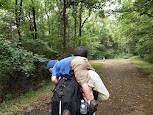When It Goes Sideways...
 |
Hop on the wagon when
you need it. |
"Out of any adversity are seeds of equal or greater opportunity." That's a quote from a good friend, and it's an important reminder that we should strive for resiliency. This means our ability to bounce back stronger because of the stress or struggle of something rough. The concept is along the continuum of shattering, cracking, surviving, thriving, and so forth. When a bad day shows up on our doorstep, whatever flavor, we need to try to have our bases covered so that we don't shatter, but rather come out of the situation...in time...stronger for the experience of the struggle.
 |
Keep moving...even
when the tide goes out. |
When we talk about "going sideways," it may take the flavor of illness, untimely death, job loss, home loss, divorce, heartbreak, medical emergency, car crash, disaster, financial emergency, or any other calamity. There are some preparedness/readiness measures that are pretty hazard-specific and others that are "hazard agnostic" or "all-hazards," as we say in the emergency field. For our families, the first step is identifying the risks in our environment in order to prioritize and categorize what could happen. This helps us see the common denominators that can cross-cut where we should prioritize our efforts and investments. For example, living a debt-free life, beyond the many inherent benefits, makes weathering just about any crisis situation smoother.
 |
Grab a pool noodle and
ride it out. |
There have been countless studies and many blog-type posts about the idea that trees grown in a "lab" setting don't do well. In order to become the proverbial mighty oak, the sapling tree needs the wind to push on it in order to become resilient. In other words, the tree becomes mighty, not in spite of the wind...but rather because of it. Similarly, we're better able to deal with setbacks and speed bumps when we've had some inoculations, or stress-in-small-doses in our past experiences. For example, a divorce would be crushing...doubly so if you never had the first "teenage breakup." Never made a "learnable mistake" with finances when you were younger and they were "survivable," imagine navigating a bankruptcy or car repossessions, prepare us for the bigger ones.
 |
Or hop the canoe to keep
a float. |
In the first responder and military circles (and others), you've heard the Post-Traumatic Stress Disorder (PTSD) and more recently dropping the "D" since it's not a disorder...you went through a beyond belief situation...and you're reacting. In order to get in front of perhaps the bad consequences or falling down the slope of life because of a traumatic experience, first responders are using Critical Incident Stress Management (CISM). It employs a peer-to-peer approach with referrals to professionals when necessary. The idea is that you share the experience and your feelings/reactions to it with a group of peers. This "breaking of bread" conversation, often around a table, helps us avoid compartmentalizing.
 |
Learn from the gator or the
manatee. |
In our families, when we're facing stress or a crisis is looming, we too should work on open, transparent communications. If we've built systems into life for this - dinner around the table, date nights, walks with the family around the block - times when we've said "family communiction is more important than _____," we're better postioned for less awkward interaction and deliberation with our family when it's hectic. Many of the CISM concepts can be paralleled in home life - dealing with the stress of a new teenager...maybe chat with peers a few years ahead of you who have been through that season of life. New diagnosis...maybe attend the support group luncheon.
 |
Bring a friend
or a brother. |
When we talk about the negative outcomes of stress, it can manifest in deep dives into our vices - withdrawing, becoming snarky, drinking too much, and many others. It's been described that over the throughout, we add little bits of water to our proverbial five-gallon bucket. That bad firefighter call - maybe we add a cup, the near miss of someone running a red light - maybe we add a teaspoon. The good news is that with healthy coping habits, we can also dip/dump some of that accumulating water out. Going on a relaxing vacation - perhaps we can remove a cup. Changing jobs to something less travel-intensive or stressful - maybe we dump half. Pay off our house - maybe dump half. Take a walk with our family in the park - maybe dump a teaspoon. What we're trying to do is avoid the bucket filling and overtopping where we blow up the status quo - divorce, mid-life crisis, new sports car, an affair, suicide, etc. It's critical to understand how full our bucket is...and more importantly, how we drain it responsibly and safely. Similarly, keep an eye on (model and check-in) with your spouse and kids on their buckets.
 |
Sometimes, push
your own wagon. |
As we continue talking about the bad things, part of resilience and getting in front of it...and through it...are recognizing that bad things can happen...even if we're doing "everything right." Bad things do happen...it sucks...but when they do happen, responding to them with intentionality and hopefully some forethought makes the bumpy ride smoother than it would have been otherwise. This visualization of "what would I do if..." or "how would I respond when..." speeds up our reactionary time when we're hit with some terrible news or dire situation. That speed and direction (or vector and velocity) help us avoid the cascading or domino-style consequences that will ultimately add to our trouble long term.
 |
Slow down
when you need. |
When we talk about things going sideways, it's important to avoid them going more sideways than "necessary." With many disasters, we can inadvertently make them worse...catastrophic even...by not slowing down or thinking clearly. Say that we have a grandma passing away in a far-away state...we can make it worse by putting the travel on a credit card, maybe no-call/no-show at our job, and getting fired, losing our apartment, etc. I know that's an extreme example, but think about how you keep a bad thing from getting worse. The whole "throw good money after bad" where we should've cut our losses, but we double down and make something worse. Think about "how do we stop the bleeding" concept in whatever your situation is...stop it from getting worse...then start working on cleaning up the mess after that. Prevent the snowball from taking off down the hill...keep it as small and as little momentum as possible.
 |
If you land on
your head...
wear a helmet. |
Lastly, as we talk through this and wrap up this week, I think it's important to include the idea that having faith and thankfulness right sizes the crisis situation. When we're staring the problem in the face, it can seem overwhelming. When we think through our heritage and how many sets of parents, grandparents, and so forth had to do what they did for us to be sitting here...that's a lot of crisis and heartache that was overcome. When we read the Bible, we realize how to overcome trouble and build resiliency. Similarly, nature (perhaps where you're closest to creation), can help us reset and right size, realizing that we're small...and our troubles are likely smaller...no matter how big they seem in the moment.
When we come back next week, we'll leave the philosophical/theoretical behind and talk a little more about the practical tips that might help you get through a situation more smoothly. Know that bad things happen...know that you can survive them...with work and intention...you can thrive on the other side of them.
With you in the arena, from ours to yours...Happy Trails!
Call to Action:
- Pick out a few things that your family can do, philosophically, to be more ready should a bad thing come to visit.
- 1 - ___________________
- 2 - ___________________
- 3 - ___________________
- Discussion: Consider what you/your family could/would/should (level of commitment) and start/stop/sustain (action) when it comes to readiness.
Further Reading, Motivation, and References:
- Yale Medicine - How To Be Resilient






































